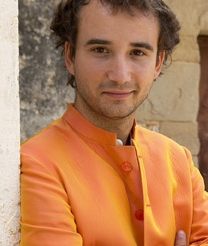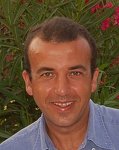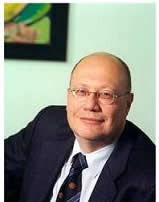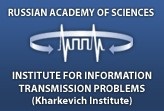Keynotes
Show all
|  |
Abstract: The unprecedented communication paradigm of machine-to-machine (M2M), facilitating 24/7 ultra-reliable connectivity between a prior unseen number of automated devices, is currently gripping both industrial as well as academic communities. Whilst applications are diverse, the in-home market is of particular interest since undergoing a fundamental shift of machine-to-human communications towards fully automatized M2M. The aim of this keynote is thus to provide academic, technical and industrial insights into latest key aspects of wireless M2M networks, with particular application to the emerging smart city and smart grid verticals.
Notably, I will provide an introduction to the particularities of M2M systems. Architectural, technical and privacy requirements, and thus applicable technologies will be discussed. Notably, we will dwell on the capillary and cellular embodiments of M2M. The focus of capillary M2M, useful for real-time data gathering in homes, will be on IEEE (.15.4e) and IETF (6LoWPAN, ROLL, COAP) standards compliant low-power multihop networking designs; furthermore, low power Wifi will be dealt with and positioned into the eco-system of capillary M2M. The focus of cellular M2M will be on latest activities, status and trends in leading M2M standardization bodies with technical focus on ETSI M2M and 3GPP LTE-MTC.
Open technical challenges, along with the industry’s vision on M2M and its shift of industries, will be discussed during the talk.
Bio: Mischa Dohler is Chair Professor in Wireless Communications at King's College London, UK. He is Distinguished Lecturer of IEEE ComSoc, Senior Member of the IEEE, and Editor-in-Chief of ETT. He frequently features as keynote speaker and had press coverage by BBC and Wall Street Journal. He is a tech company investor and also entrepreneur, being the cofounder, former CTO and now with the Board of Directors of Worldsensing. He is fluent in 6 languages.
In the framework of the Mobile VCE, he has pioneered research on distributed cooperative space-time encoded communication systems, dating back to December 1999 and holding some early key patents. He has published more than 160 technical journal and conference papers at a citation h-index of 32 and citation g-index of 67, holds a dozen patents, authored, co-edited and contributed to 19 books, has given more than 30 international short-courses, and participated in ETSI, IETF and other standardisation activities. He has been TPC member and co-chair of various conferences, such as technical chair of IEEE PIMRC 2008 held in Cannes, France. He is/has been holding various editorial positions for numerous IEEE and non-IEEE journals and special issues.
From 2008-2013, he held various roles at CTTC such as Director of Research, Head of Intelligent Energy [IQe] and Senior Researcher. From 2010-2012, he has been the CTO of Worldsensing. From 2005 to 2008, he has been Senior Research Expert in the R&D division of France Telecom, France. From 2003 to 2005, he has been lecturer at King's College London, UK. At that time, he has also been London Technology Network Business Fellow receiving Anglo-Saxon business training, as well as Student Representative of the IEEE UKRI Section and member of the Student Activity Committee of IEEE Region 8 (Europe, Africa, Middle-East and Russia). He obtained his PhD in Telecommunications from King's College London, UK, in 2003, his Diploma in Electrical Engineering from Dresden University of Technology, Germany, in 2000, and his MSc degree in Telecommunications from King's College London, UK, in 1999. Prior to Telecommunications, he studied Physics in Moscow. He has won various competitions in Mathematics and Physics, and participated in the 3rd round of the International Physics Olympics for Germany.
 | Wireless MAC Layer Programmability from a Software Defined Networking PerspectiveProf. Giuseppe Bianchi, University of Roma Tor Vergata |
Abstract: Wireless MAC protocols have been traditionally deployed as monolithic, one-size-fits-all, standards. In contrast, flexibility and programmability of wireless devices appear crucial to foster innovation and customization, so as the accommodate the need of customers (and applications) for personalized delivery and quality of experience, and overcome performance limitations by smartly exploiting opportunistically available spectrum and resources in dense environments. Moreover, wireless protocols originally designed for general scenarios are now stretched so as to fit the very diverse needs of niche contexts and deployments (industrial automation, domotics, military, emergency, machine to machine, etc).
In this talk, we revisit very recent advances in the field of wireless MAC programmability. We specifically focus on programming approaches which do not require open source network interface cards, but still permit dynamic MAC protocol stack reconfiguration in negligible (sub-microsecond) time. This is accomplished by decoupling a set of “dumb” (hard-coded) primitives, from a third-party provided “smart” MAC protocol logic, provided in the form of (extensible) finite state machines which formally specify how such primitives shall be executed. We argue that such ideas and approaches, although technically different and relying on different abstractions, appear to enrich the wireless access domain with software-defined networking concepts that are today leading the data centers and wired networks innovation.
Bio: Giuseppe Bianchi is Full Professor of Telecommunications at the School of Engineering of the University of Roma Tor Vergata, current chair of the relevant Bachelor/Master teaching programme in Internet Technology engineering, and former chair of the Telecommunications and microelectronics PhD programme. His research activity, documented in about 180 peer-reviewed papers accounting for more than 9300 citations, spans several areas including wireless LANs, privacy and security, design and performance evaluation of broadband networks, network monitoring. His analytical models concerning the performance analysis of 802.11 WLAN networks are well known in the research community. He is editor for IEEE/ACM Trans. on Networking and Elsevier’s Computer communication, and area editor for IEEE Trans. on Wireless Communications. He has (co-)chaired more than 10 international IEEE/ACM conferences/workshops, the next major one being IEEE Infocom 2014 (technical co-chair). He has been involved in several European funded project, with general and/or technical coordination roles for the projects FP6-DISCREET (privacy in smart environments), FP7-PRISM (privacy-preserving network monitoring), FP7-DEMONS (distributed network monitoring) and FP7-FLAVIA (programmable wireless systems).
How to Influence the Major Trends in Mobile Communication?
|  |
Abstract: Accommodation of the predicted rapid growth of mobile data traffic is creating serious challenges.
In this talk I will separate the notion of mobile data service and the data transport needed for the service.
We argue that it is desirable and feasible to mitigate the traffic volume needed for achieving satisfactory services. In addition, we argue that traffic volume is not a proper measure reflecting the “transportation effort” in mobile communication. Various means to reduce this “transportation effort” and measures to quantify it will be presented. We conclude that more effort should be devoted to mitigation of the traffic growth as well as efficient traffic organization in contrast to accommodating the traffic explosion by purely blowing up the communication capacity.
In this talk, the above issues will be discussed from the technology point of view. In addition we will also present some thoughts about possible new charging models able to encourage the desired trends.
Bio: Adam Wolisz is chaired Professor of Electrical Engineering and Computer Science at the Technische Universitat Berlin, where he has founded and is leading the Telecommunication Networks Group (TKN). Currently he is executive director of the Institute for Telecommunication Systems, grouping the activities in Communications, Networking and Distributed Systems. In parallel he is also adjunct Professor Department of EE&CS, University of California, Berkeley (BWRC).
His research interests are in architectures and protocols of communication networks as well as in protocol engineering with impact on performance and QoS aspects. Recently he is working mainly on mobile multimedia communication, sensor networks, cognitive / coopeative wireless systems.
The research topics are usually investigated by a combination of simulation studies and real experiments.
His teaching activities encompass courses on Communication Networks and Protocols, Wireless/Mobile Networks and Performance Analysis of Communication Networks. He has authored two books and authored or co-authored over 200 papers in technical journals and conference proceedings.
He is senior member of IEEE, IEEE Communications Society (including the TCCC and TCPC) and member of ITG. He is a member of the Steering Board of the GI/ITG Technical Committee on Communication and Distributed Systems (KuVS).



